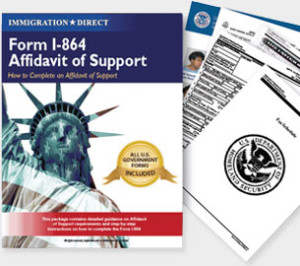Most petitioners for immigrant visas are familiar with Affidavits of Support that are required to be submitted before the future immigrant is issued a visa. What are the responsibilities of a person who signs an affidavit of support for an intending immigrant? What will happen if the petitioner does not have enough income to support another person?
Pablo petitioned for Nathan, his single adult child, more than 10 years ago. The National Visa Center initiated the visa processing recently and an affidavit of support is required to be submitted. Pablo is reliant only on his monthly welfare check or Supplemental Security Income (SSI). He lives in a rented room owned by his brother. He wants Nathan to immigrate to the United States so that Pablo will have his son to hopefully support him during his remaining years.
Pablo’s brother who lives with him refuses to sign an Affidavit of Support because he claims that he has his own financial issues. What can Pablo do to enable his son to complete his visa processing and travel to the United States?
In order that future immigrants do not become a public charge, US immigration law requires the applicant for visa to submit an affidavit of support from the petitioner on Form I-864. The petitioner or sponsor must show evidence of “the means to maintain an annual income equal to at least 125 percent of the Federal poverty line”.
Clearly, the U.S. government expects the sponsor to provide support to the intending immigrant and to make sure that s/he does not rely on any federal or state agency for means tested benefits. Finding a co-sponsor may be a challenge for some petitioners, and sometimes there is malicious refusal to sign affidavits of support by relatives in a few dysfunctional families. Whatever it is, there are alternate ways to meet the Affidavit of Support requirement.
In case the petitioner does not meet the income level as set by the federal poverty guidelines, the law permits him to consider the income or assets belonging to other household members. The latter may be the spouse, children, parent, sibling or another relative who lives in the same principal residence as the petitioner. If there is no sufficient income or asset of the petitioner or household member, the next step is to secure a co-sponsor who can satisfy the financial requirements of the affidavit of support.
In the case of Pablo, while he has a household member who is a relative, the latter is unwilling to sign the affidavit. Pablo’s option is to seek an Affidavit of Support from his non-household relatives or friends who will be willing to be co-sponsors and who have sufficient income to meet the federal poverty guideline. Absent a co-sponsor’s affidavit of support and given the inability of Pablo to meet the income requirement, Nathan will not be able to get a U.S. immigrant visa. The law provides very few exceptions law on certain classes of immigrant visa petitions. The case of a Filipino seeking an immigrant visa based on a family petition is not one of the exceptions.
(Atty. Lourdes Santos Tancinco is a San Francisco CA based immigration attorney and a partner at Tancinco Law Offices. She may be reached at 1 888 930 0808, law@tancinco.com, www.tancinco.com or at www.facebook.com/tancincolaw)


